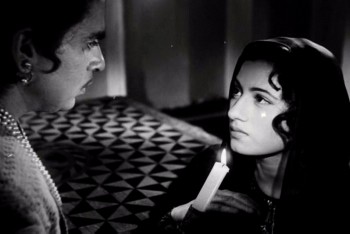
Mughal-e-Azam again and forever, but this time on the big screen at Walter Reade, in the original version, not 2004 full colorization. As heady a myriad of beauty and sensation as ever. The full ten scintillating seconds of pearls sent scattering, pattering onto a polished patterned floor. The billet-doux secreted into the lotus flower, the flower’s shuddering yet purposive drift down the canal. Anarkali’s candle, sliding slowly downscreen and leaving her face in eclipse, only to be held in Salim’s hand when it next appears—surely their first and most furtive act of touch; her hand then rising again to cup its flame for modesty, proximity, and gentler chiaroscuro. Those drowsy flurries of giant feather across her face—brushing her eyes closed, sweeping her lips ajar, soon transporting both to blossoming grove then bed of petals—as Tansen’s raga drugs all passage of time. The hulk and chafe of the hay-lined prison cell, the iron chains that famously bruised Madhubala during filming. The robust foil, no lightweight rival, that is Bahar—her solid ambitiousness, her steady challenging gaze. And of course the infinite reflections righteously shimmering across the mirror medallions of the Sheesh Mahal—taunting Akbar as Anarkali sings love’s truth to power: “Pyar kiya tho darna kya… aaj kahenge dil kaa fasaanaa.”
Madhubala’s face—barer and barer with each ordeal yet ever dewier and more arresting in its beatific resolve—and Dilip Kumar’s most lustrous hair. Who could fight the urge to sing to him and to his hair, “Ude jab jab zulfen teri, kavaariyon ka dil machle—jind meriye”?
The imperial-scale mustering of decade-long labor across the land that produced this dense cinematic lavishness, the gratuitous war between Akbar and Salim that inadvertently dramatizes these contributions. The hallucinogenic plot loops (not twists) in the third hour, the late dabs of dialogue thickening Akbar’s pathos, the final resolution by which point satisfaction no longer depends upon any. All of it mysterious, all of it immediate.
One Comment